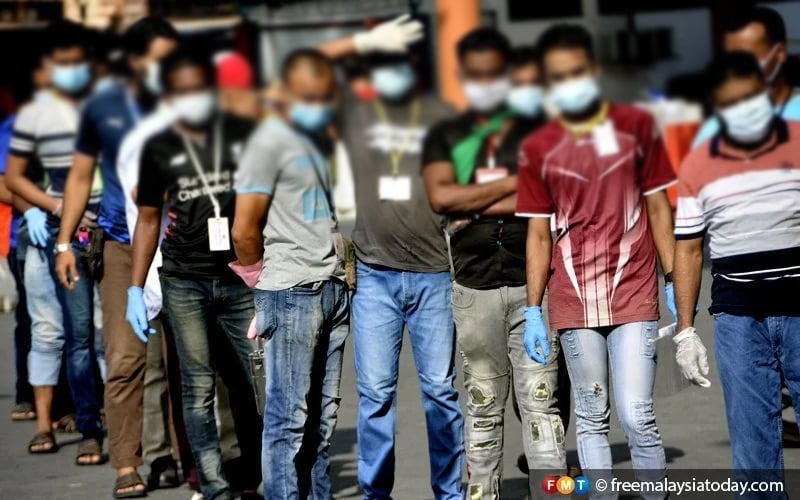
From Charles Santiago
* Part 2 of an account of modern-day slavery, forced labour and abuse perpetrated against a group of migrant workers from Bangladesh. Part 1 was published yesterday.
Ahmed’s eyes were hopeful but tinged with a heavy dose of frustration, helplessness and despair. He is scrawny, of medium height, and comes from a poor family.
I came to know of Ahmed when he and his friends posted a plea for help on my official Facebook page.
They contacted me when their repeated plea for help with the staff at the Bangladesh High Commission fell on deaf ears.
Upon hearing their heart-wrenching story, I decided to do everything possible to help them.
When Ahmed and his friends arrived at what was once a cheap motel, a group of 26 people was already inhabiting an adjacent room.
Some from this group have been around since December and have worked for two months in Penang and Johor. They were not paid their due wages but were given RM300 by the agent when they began questioning him.
These men had their construction personnel registration card from the Construction Industry Development Board (CIDB).
Ahmed and 40 others were put in an empty room. It became even more cramped when they were joined by a group of 30 people five days later.
Ahmed said they hardly had enough space to sleep and had to crouch to fit into the curves of each other’s bodies.
There were no fans, and all 71 of them shared one bathroom and toilet. “It was hell,” he said.
According to Ahmed, there was a Nepali woman believed to be the hotel manager, who gave them rice, dhal and vegetables twice a day, plus a small bottle of water once a day. As that wasn’t enough, they used whatever money they had on them to buy more water.
The agent, Derek, has a Bangladeshi manager named Ravi, who acts as a spokesman and overseer. Ravi comes by every 20 days and tells them that they will get a job soon. But, they were given construction personnel registration cards.
One day, some policemen spotted one of Ahmed’s friends outside the building, speaking on his phone. They followed him back to his room, scanned the place, and instructed some of them to put on their shirts, even though the men told them it was blazing hot.
Then, the interrogation began.
They showed the police a photocopy of their passports and the little information they had about the agency.
The police asked them to call Ravi, but he didn’t answer any of the 30-40 calls made to him.
The police officer then made Ahmed and his friends sit down with their phones faced downward to ensure nobody was recording. When one man tried recording sneakily, the police grabbed his phone and smashed it to pieces.
Another policeman slapped one migrant worker after finding cigarettes in his possession.
One of the workers had a bag, which caught the attention of the policemen. They found RM500 in cash, and smirking at the workers, one policeman tore up a RM100 note, burned another RM100 note using his lighter and took the remaining RM300.
“We were shocked and completely heartbroken. This is arrogance and an abuse of power.
“But why show their power to us, a bunch of poor people who have come to work in your country?” Ahmed asked.
The police then instructed the workers to give whatever money they had as a bribe to ensure they were not arrested for lacking original documents, following which the men pooled together pocket change.
“We were confined in a small room like animals. Even then, the police officers extorted money from us,” Ahmed said, tearing up.
According to him, Ravi and Derek arrived an hour later with a bag of passports, and Derek paid off the policemen. One policeman apologised to the workers before leaving.
As a stroke of luck, or that’s what Ahmed thought initially, the labour department (JTKSM) intervened after a tipoff and questioned Derek about the terrible living conditions and lack of proper food, to which he lied and said the workers had just been brought two days before and will be taken elsewhere after another two days.
But, according to Ahmed, Derek was visibly afraid of JTKSM personnel. The officers snapped pictures of their room and took the only photocopy of their passports.
They then insisted that the workers must be moved as the living conditions were appalling.
Three days later, they loaded some of the men onto a bus and relocated them to a government facility after 25 days of being cooped up in a small room. The remaining 20 workers were taken to Penang by Derek. Ahmed remained in KL.
The JTKSM did not make any effort to verify if Derek and the 20 workers had the necessary legal documents to travel and work.
Ahmed kept in touch with the 20 workers and found out they were forced to work in dangerous jobs without personal protection equipment, leading to cuts on their palms, hands and bodies.
They were not paid. One worker had run away as a result of abuse and harsh work conditions.
Here are some of the labour laws, including forced labour violations:
1. Abuse of vulnerability;
2. Deception;
3. Restriction of movement;
4. Isolation;
5. Physical violence;
6. Intimidation and threats;
7. Retention of identity documents;
8. Withholding of wages;
9. Debt bondage; and
10. Abusive working and living conditions.
- FMT
Next: When will our ordeal be over? Will the Malaysian government help us?
Charles Santiago is former MP for Klang and an FMT reader.
The views expressed are those of the writer and do not necessarily reflect those of MMKtT.



No comments:
Post a Comment
Note: Only a member of this blog may post a comment.